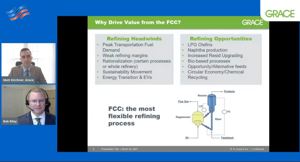2021 AFPM Annual Meeting Virtual Edition: The future of the most flexible refining process
STEPHANIE BARTELS, Digital Content Manager, Hydrocarbon Processing
On Monday of the 2021 American Fuel and Petrochemical Manufacturers (AFPM) Annual Meeting, Bob Riley, Director, Energy and Sustainability and Matt Kirchner, Director, Segment Marketing at W.R. Grace & Co. shared a presentation on the future of the most flexible refining process-Fluid Catalytic Cracking (FCC) and how Grace is approaching the future of FCC technology.

Why is the FCC’s flexibility important? Fundamental aspects of FCC enable the development of future technology. FCC is one of the most important conversion processes used in refineries due to the extreme flexibility to handle diverse feedstocks. Unique attributes that make FCC so flexible include: a unique heat management system, heat balance, it can be adapted to work beyond “heat balance,” reaction residence time from milliseconds to minutes, sophisticated product treating systems, catalyst contaminants can be addressed online, catalyst technology, catalyst management strategy, and feed (and air/O2) as the only ‘reactant.'
Mapping refinery opportunities to FCC direction. The future direction of FCC is created by refining headwinds such as peak transportation fuel demand, weak refining margins, sustainability movement and energy transition/electric vehicles. Over the last year, Grace’s FCC customers have requested a variety of things made possible by flexible technology. Customers have requested: higher con-carbons, higher metals, process bio-based feeds, process feedstock from other refining units and the ability to handle new but “traditional” VGOs from opportunity crudes. Mr. Riley noted that the flexibility of the FCC to handle such requests will be an absolute key in ensuring its future.
How Is Grace innovating to address future challenges? Riley noted the future of this technology requires a very broad base of innovations. “FCC needs to be adapted to meet the future needs of the world,” he said. It is a critical piece of the Grace strategy and the industry’s strategy for the future. Grace is investing in all aspects of its FCC catalyst business. “We have bolstered the key structures in our company necessary to play our part in driving technology adaptation for the future.” These include investments in the business, product technology/innovation, and technical service and support.
Mr. Kirchner shared Grace’s commercialized new product technologies, which include:
-ACHIEVE 400 catalyst solution: Introduced in 2013 to target the butylene and octane selectivity demand from refineries.
-FUSION: A novel catalyst based on a new process technology, targeted to resid operations.
-Molecular Highway® Zeolite Technology: With conventional Y Zoelite, molecules with kinetic diameters up to roughly 1 nm (10 Å) can directly enter the Y zeolite structure. This corresponds to hydrocarbons which boil up to around 950°F (510°C). Larger hydrocarbons are traditionally subjected to matrix aluminas. These materials have somewhat weaker acid sites and the goal is to cleave off hydrogen-rich side chains that can subsequently enter the zeolite cage.
-EMISSCIAN: New SOx reduction additive
Mr. Riley stated the key focus is not on the number of products, as the list reviewed is a subset of eight new major technology launches from Grace in the last two years. “The point is that driving a continuous pipeline of innovation is what is necessary to continue to drive value from the FCC,” Riley said. “And to do it requires focus and commitment to solving the problems – some old, but many new – that can be addressed with the FCC.”
Technical support investments. Grace redesigned its technical support portal, eCatalysts.com, launched a third ECAT analysis laboratory in Oman, integrated with Grace’s ECAT analysis network and released the 2nd edition of Grace’s Guide to Fluid Catalytic Cracking in 2021.
In summary, Riley said there is no single direction that will represent the future of FCC. The flexibility of FCCs will make them a critical part of the global infrastructure for decades.






Comments